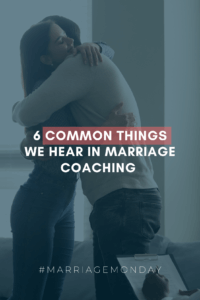
Mark: Jill and I developed our marriage ministry because we wanted to use our own marriage pain and healing work to help others, and boy did we get a huge number of requests once we started offering marriage coaching.
Jill: You know, we’ve received hundreds of requests from couples looking for help for their marriage – everything from recovering from an affair, building better communication, and reconciling differences.
Mark: As we listen to other couples’ stories, we began to notice some similar phrases and statements.
Jill: After you’ve been coaching couples for a while, you start to notice similar patterns in couples – both the good and the bad. Today, we are going to review some of the most common things we hear in marriage coaching with you!
Mark: Our hope is that sharing these commonly heard phrases will help you in your own marriage and challenge some unhelpful thinking you may have.
My spouse is a narcissist.
Jill: The first one is this: “My spouse is a narcissist.” We hear this phrase all the time! The issue with this phrase is that too often people use the term narcissist as a catch-all for poor relationship skills. Not every person with bad relationship skills is a narcissist.
Mark: We like to reference our friend, Shaunti Feldhahn, when describing the difference between these two. She categorizes the difference as “people with bad skills” and “people with bad hearts.” Those with a bad heart are the ones who are true narcissists.
Jill: In Shaunti’s research while co-authoring a book with a therapist, the therapist said in all his years he’s only seen six true narcissists out of the thousands of people he’s seen. When it comes to your marriage, be careful about labeling your spouse’s lack of skills as narcissism.
I don’t feel loved.
Mark: Another common thing we hear in marriage coaching is “I don’t feel loved.” There are two sides to feeling loved; there’s the internal work you have to do and the external work you need your spouse to do.
Jill: The internal work has to do with finding your identity, value, and worthiness. Although this might be something that you discover with your spouse, these are things that you can work on by yourself to help you strengthen your identity in Christ.
Mark: I had to do internal work because Jill was loving me and I still didn’t feel loved. I had to own that part of my healing journey.
Jill: External work is when your spouse needs to learn how to better connect with your heart and feel loved by them. This could be taking the time to learn your love language or to be more aware of your attachment style. We both had to do external work to learn how to better love each other.
I don’t feel heard.
Jill: “I don’t feel heard” is another phrase we commonly hear in our marriage coaching. There is actually a communication format we teach couples in our marriage coaching. It’s called a connecting conversation and we share about it here: How to Have a Safe Conversation. This walks couples through the steps of helping their spouse feel heard and connected to them. Check out this recent blog where we detail each step of the process.
Mark: I know practicing safe conversations has really helped in our own marriage!
I love you but I’m not in love with you.
Mark: This phrase assumes that love is a feeling rather than a decision. Whenever someone says this, they are really saying, “I am choosing to no longer love you.”
Jill: There is such an important distinction between love being a feeling or a choice. There are days when we definitely don’t feel like we love each other, but we make the conscious choice every single day to continue to love one another.
Mark: If you need to learn more about love, check out this podcast episode.
My spouse doesn’t want to have sex.
OR
My spouse doesn’t want to emotionally connect.
Mark: Most couples don’t realize that these are intrinsically connected. In order to have true sexual intimacy, you have to prioritize emotional intimacy.
Jill: We actually go a little deeper into how desire works on the podcast with Shaunti Feldhahn & Dr. Michael Sytsma. We highly recommend checking it out if you want to learn more about the difference between initiating desire and responsive desire.
Mark: Our marriages need both emotional connection and sexual connection. Don’t check out of either one! Make them both a priority!
My spouse just wants me to forgive and move on.
Jill: This is a big one because rarely do people understand how trust is rebuilt and relationship is restored. Forgiveness only opens the door for trust to be rebuilt, but that does not mean trust is automatic. It’s only through consistent changed behavior over time that trust can be rebuilt.
Mark: And the length of time it takes to rebuild trust will vary from couple to couple. There is no standard amount of time it takes.
Jill: I know it took us a while to rebuild trust in our relationship. Because we choose to love each other and stayed committed to rebuilding our marriage, we came out the other side as a healthier Mark and Jill.
Mark: That’s right! We’ve moved from Mark and Jill 1.0 to Mark and Jill 2.0. Our relationship is healed, our hearts are connected, our family is intact and we have the marriage we always longed to have.
********
Jill: If you have found yourself thinking any of these phrases or if your marriage is “hanging on by a thread,” then we invite you to check out our marriage coaching. We offer one-on-one coaching, couples coaching, and a three-day marriage intensive. We truly love getting to offer hope and help to hurting couples.
Are you ready to start rebuilding trust?
Learn how through our free Rebuilding Trust webinar!












